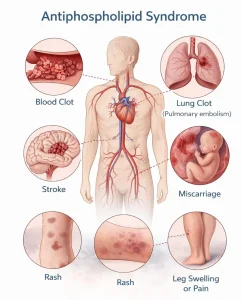Overview
Diagnosis of Antiphospholipid Syndrome
If you experience unexplained blood clots or recurrent pregnancy loss, consult your healthcare professional. Diagnosis involves:
Blood tests for antibodies
-
Tests are done to check for antiphospholipid antibodies and clotting problems.
-
For a confirmed diagnosis, antibodies must be present in your blood at least twice, with tests conducted 12 or more weeks apart.
Important considerations
-
Some people may have antiphospholipid antibodies without symptoms.
-
A diagnosis is made only when these antibodies cause health complications, such as clotting disorders or pregnancy-related issues.
Treatment of Antiphospholipid Syndrome
Treatment focuses on preventing and managing blood clots and reducing pregnancy complications.
Blood-thinning medications
-
Heparin: Fast-acting, delivered via injections.
-
Warfarin (Jantoven): Oral medication that takes several days to take effect.
-
Aspirin: Used to prevent blood clots in certain cases.
-
Regular blood tests monitor dosage to maintain safe clotting levels and reduce bleeding risks.
Additional treatments
-
Some studies suggest that hydroxychloroquine (Plaquenil), rituximab (Rituxan), eculizumab (Soliris), and statins may be beneficial, though further research is needed.
Treatment During Pregnancy
-
Heparin, sometimes combined with aspirin, is typically used to support a successful pregnancy.
-
Warfarin is avoided during pregnancy due to its potential harm to the fetus.
-
With careful management, successful pregnancies are possible for individuals with antiphospholipid syndrome.
Advertisement

